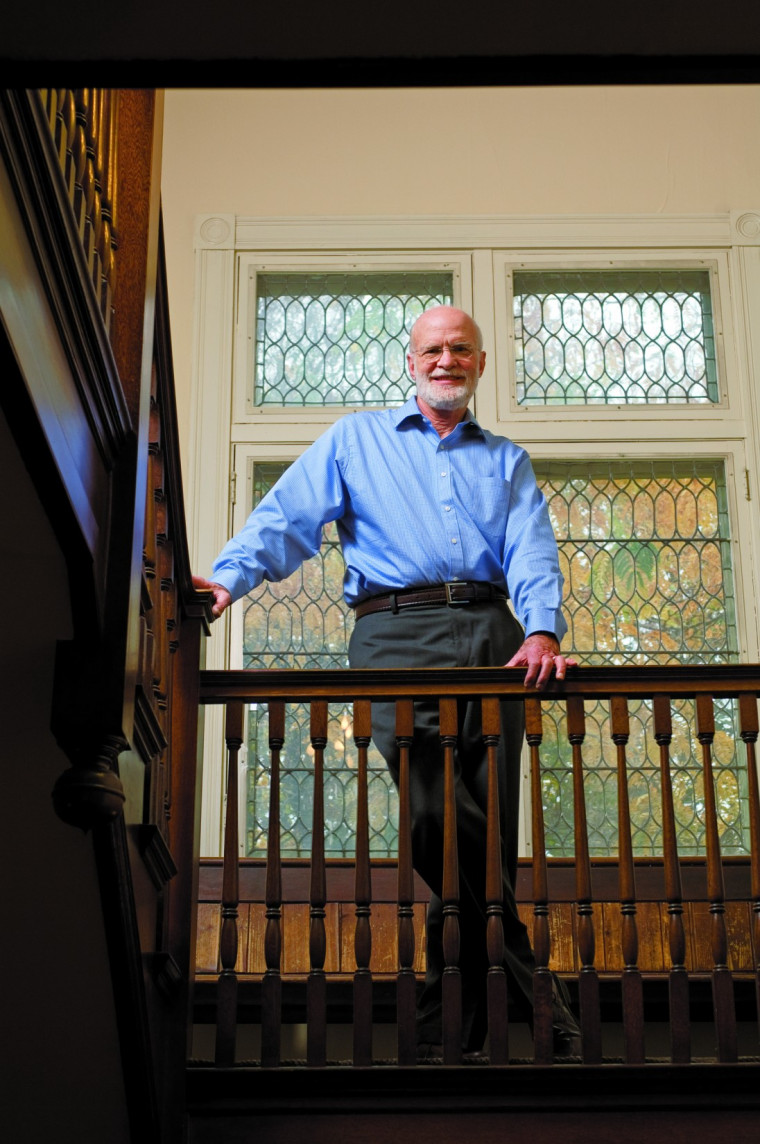Jeff Rogers: Of Counsel
Open gallery

As the man steps off the curb and stumbles into traffic, a car swerves, blares its horn, and barely misses him. He sways for a moment, looking startled, then shakes his fist at the retreating vehicle. He gathers up the filthy bundle that holds his worldly possessions and smoothes his tattered clothing. He needs to hustle if he’s going to get the free meal at the mission five blocks away.
Across the street, a man in a suit carrying a messenger bag stops in midstride, startled by the loud horn and resulting commotion. He breaks into a sweat, his hands tremble, and he ducks into a nearby coffeehouse to try to calm his jangled nerves.
In this scenario, it might well be the businessman, not the homeless person, who has war-related post-traumatic stress disorder (PTSD). Jeff Rogers MA ’04 has counseled many combat veterans with PTSD, including political figures, leaders in business and the arts, and longtime teachers.
“Veterans with PTSD are just like you and me, except they have to struggle with an injury to the brain that is just as real and physical as losing limbs—it just isn’t as visible,” he says. Rogers works as a volun- teer counselor at the Portland Vet Center and as a counselor in private practice.
Rogers’ commitment to overturning the public’s perception of veterans with mental health issues and helping them heal defines his work as a therapist. He vehemently objects to distorted portraits of homeless veterans often perpetuated by the media. In fact, of the 300 veterans with PTSD he’s counseled, only 10 were homeless. “Veterans with PTSD cover a wide demographic, educational, and functional range,” he says. The diversity helps keep the work interesting and meaningful for him. “Like those who’ve lost limbs, eyes, or other physical function, veterans with PTSD often struggle quietly and bravely to overcome their injuries. I want to help dispel misleading stereotypes that can interfere with their ability to heal.”
It’s that kind of passion that fuels Rogers’ work. “I’ve always been interested in mental health,” he says. He’s sitting in his private counseling office in an old Victorian in the Corbett neighborhood of southwest Portland. Trim and white-haired, at 65, Rogers looks competent and comfortable, like he’s been doing this work all his life.
But in fact, Rogers was a prominent attorney for nearly 30 years. He holds a law degree from Yale Law School. He worked for the Public Defender’s Office, for the U.S. Attorney’s Office, and for the City of Portland, becoming city attorney. He was successful, experienced, well-respected. He could have retired comfortably. Instead, at 57, while still working as a lawyer, he enrolled in Lewis & Clark’s Graduate School of Education and Counseling to get a master’s degree in counseling and become a licensed professional counselor.
“I loved my legal career,” he says, “but it was time to move on to something new. The Lewis & Clark program is very supportive of older students and is geared for people who have careers.”
Originally intending to be a doctor, he began studying at Harvard Medical School. “After a year of that, I came to my senses,” he says, chuckling.
With lots of lawyers in his family, enrolling in law school was a logical choice. After his military deferral ran out during the Vietnam War, he joined the Navy and served aboard a hospital ship. The experience gave him deep insight on the trauma war can inflict.
“At many stages in my legal career, I had connections to the mental health field,” he recalls.
His first assignment as a young attorney was representing people who were facing civil commitment to a mental institution. Later, he worked on cases involving the insanity defense and coauthored professional articles on the topic with local psychiatrist Joseph Bloom, MD He taught law and psychiatry at Lewis & Clark Law School and at Oregon Health & Science University. And he chaired the Oregon Psychiatric Security Review Board, which has jurisdiction over people who are found guilty of crimes “except for insanity.”
“When I was an attorney, people told me I was really good at counseling—and that was the part of my practice I really liked,” he says.
By the time Rogers graduated in 2004, he knew he’d go into private practice and specialize in counseling attorneys. “My past work as a lawyer helps me understand the pressures on those who work in the legal profession, and on their family members,” he says. “Practicing law is an extremely public profession—you’re exposed to col- leagues, the public, the media. Often, what you do ends up on the front page of the newspaper. People who aren’t lawyers may not understand the impact of that, but I understand it very well.”
He also knew he wanted to help veterans. “My work ties together all the things I’m interested in. It’s a privilege to have people open up to you and tell you things they’ve never told anyone else. It’s also amazing to have someone like a veteran say, ‘You saved my life.’ That’s just incredible.”
More L&C Magazine Stories
Lewis & Clark Magazine is located in McAfee on the Undergraduate Campus.
MSC: 19
email magazine@lclark.edu
voice 503-768-7970
fax 503-768-7969
The L&C Magazine staff welcomes letters and emails from readers about topics covered in the magazine. Correspondence must include your name and location and may be edited.
Lewis & Clark Magazine
Lewis & Clark
615 S. Palatine Hill Road MSC 19
Portland OR 97219


